One of the problems in Armenia’s media sector is that it’s quite rare to snare someone in the daily news or during coverage of controversial topics.
I’m not talking about an abstract human being or politicians commenting on the issue everywhere using the same words and same facial expressions or activists who’ve made expressing an opinion their profession, but about specific people who feel the issue on their own skin — solid and familiar.
When taxi drivers recently protested and spoke about decisions and laws that directly attack their pockets and the future, the media covered the news with moderate enthusiasm. It was approximately this approach that prevailed in the work of the media: the problem arose and now the solutions are being sought. The taxi drivers protested; met with this minister, that deputy minister, this official, and that representative… They assured them, promised, gave orders…
For the most part, the granting of licenses to taxis and taxi drivers’ problems weren’t particularly interesting for the public. The same problems exist in almost all sectors and are perceived with almost the same hopelessness (even if coverage is moderately enthusiastic).
But it’s interesting that in just a single day, the taxi drivers’ voice was heard and perceived in the media. A guest on Kentron TV’s Urvagits talk show
ARVE error: The [[arve]] shortcode needs one of this attributes av1mp4, mp4, m4v, webm, ogv, url
In one day, this program was viewed over 110,000 times on YouTube alone, shared on various social networking sites, and cited by various local online news media. Fans even created a Facebook page in his name, where users have been leaving ecstatic and inspiring comments. Another Facebook page was launched naming Arman Galstyan as a public figure.
Very quickly and smoothly, gaining the media’s attention was a man who though until then had appeared in different reportages for only a few minutes or seconds, by and large, was unknown to the audience. Until now.
It’s very interesting how the mechanism of becoming famous in the media and due to the media works. Sometimes you need to put serious effort and money for the media to write and speak about you (the effort and money can also be spent in vain), but sometimes it’s enough just to speak on your own behalf, in your everyday language, and on the topic you know.
The second option definitely is more effective and promising, since it shows that you’re not playing with the audience; on the contrary, you’re involving the audience to jointly discuss an issue on which you are the most well-informed. If you can convince them that you’re informed and compassionate, then you’ve won them over. And taxi driver Arman Galstyan did just that.
In a single program, he did that which there is a shortage of in our media: he showed that by being informed and concerned, one does not need to wear a mask and stiffen his words and thoughts. After all, the taxi drivers’ licenses, inspections, taxes and various associated expenses were simply an opportunity to contemplate deeper concerns and problems.
The length of the Urvagits program is quite long, and in order to speak for 40 minutes and not bore the audience you really have to be an interesting person. The mind can wander, the topic can jump, the language might go limp or soar, but what’s important is being able to explain the world order in your own vocabulary and by feeling it on your own skin.
In order to watch a program with pleasure, there must be a person who speaks and convinces well, who is familiar, in his place, and speaks from his place. It’s good when the media remembers this.
Nune Hakhverdyan







